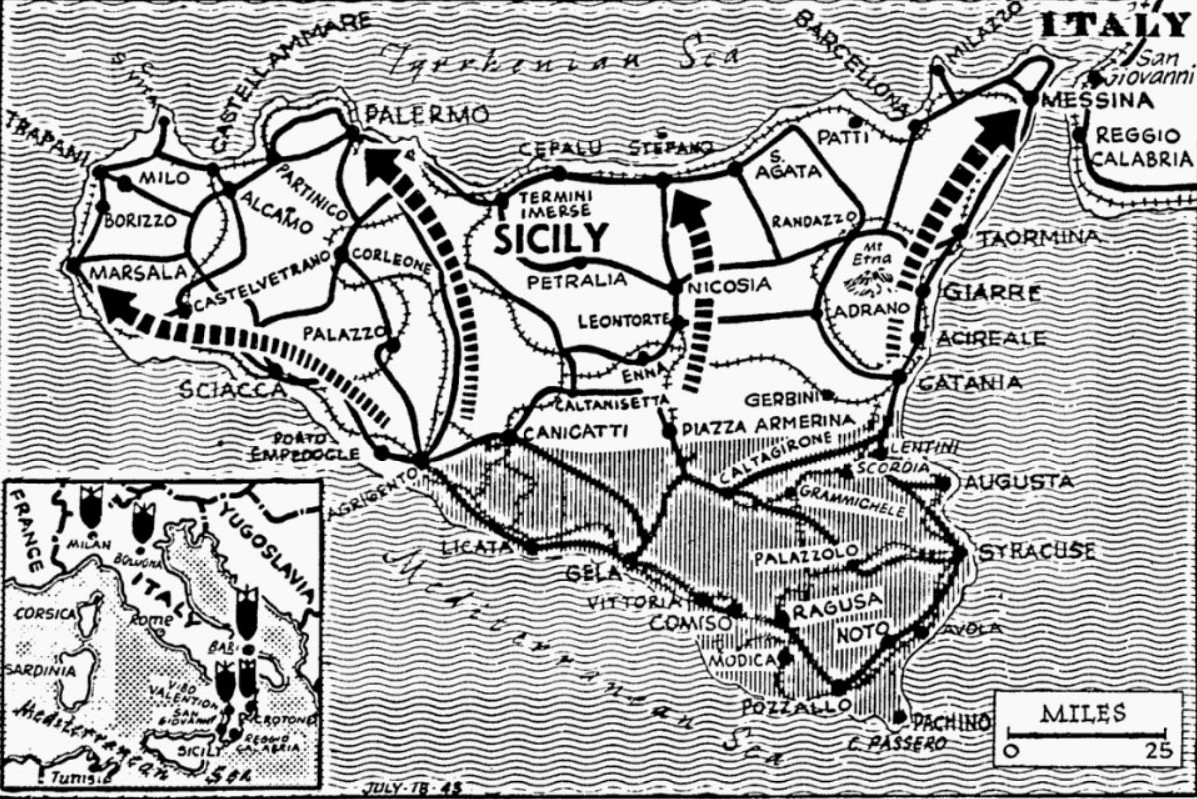
Roving Reporter
By Ernie Pyle
Southern Sicily, Italy – (by wireless)
At the end of the first day of our invasion of Sicily, we Americans looked about us with awe and unbelief and not a little alarm.
It had all been so easy it gave you a jumpy, insecure feeling of something dreadfully wrong somewhere. We had expected a terrific slaughter on the beaches and there was none.
Instead of thousands of casualties along the 14-mile front of our special sector, we added up a total that was astonishingly small.
By sunset of the first day the Army had taken everything we had hoped to get during the first five days.
Even by midafternoon the country for miles inland was so saturated with American troops and vehicles it looked like Tunisia after months of our habitation instead of a hostile land just attacked that morning.
And the Navy which had the job of bringing the vast invading force to Sicily was three days ahead of its schedule of unloading ships.
Convoys had started back to Africa for new loads before the first day was over.
The invading fleet had escaped without losses other than normal, mechanical breakdowns. Reports from the other two sectors of the American assault front indicated they had much the same surprising welcome we got.
Americans are wondering
It was wonderful and yet it all was so illogical. Even if the Italians did want to quit, why did the Germans let them? What had happened? What did the enemy have up its sleeve?
As this is written on the morning of the second day, we don’t yet know. Nobody is under any illusion that the battle of Sicily is over. Strong counterattacks are inevitable. Already German dive-bombings are coming at the scale of two per hour but whatever happens we’ve got a head start that is all in our favor.
For this invasion I was accredited to the Navy. I intended writing mainly about the seaborne aspect of the invasion and had not intended to go ashore at all for several days, but the way things went I couldn’t resist the chance to see what it was like over there on land, so I hopped an assault barge and spent all the first day ashore.
When we got our first look at Sicily, we were all disappointed. I for one had always romanticized it in my mind as a lush green, picturesque island. I guess I must have been thinking of the Isle of Capri.
Wind slows landing
Instead, at any rate, the south coast of Sicily is a drab, light-brown country. There aren’t many trees. The fields of grain had been harvested and they were dry and naked and dusty. The villages are pale gray and indistinguishable at a distance from the rest of the country. Water is extremely scarce.
Good-sized hills rise a half mile or so back of the beach and on the hillsides grass fires started by the shells of our gunboats burn smokily by day and flamingly by night.
It is cooler than North Africa; in fact, it would be delightful were it not for the violent wind that rises in the afternoon and blows so fiercely you can hardly talk in the open. This wind, whipping our barges about in the shallow water delayed us more than the Italian soldiers did.
The people of Sicily on that first day seemed relieved and friendly. They seemed like people who had just been liberated rather than conquered. Prisoners came in grinning, calling greetings to their captors. Civilians on the roads and in the towns smiled and waved. Kids saluted. Many gave their version of the V sign by holding up both arms. The people told us they didn’t want to fight.
It’s as bad as Africa
Our soldiers weren’t very responsive to the Sicilians’ greetings. They were too busy getting all possible equipment ashore, rounding up the real enemies and establishing a foothold, to indulge in the hand-waving monkey business.
After all, we are still at war and these people though absurd and pathetic are enemies and caused us misery coming all this way to whip them.
On the whole the people were a pretty third-rate-looking lot. They were poorly dressed and looked like they always had been. Most of them hadn’t much expression at all and they kept getting in the way of traffic just like the Arabs. Most of our invading soldiers, at the end of the first day in Sicily, summed up their impressions of their newly-acquired soil and its inhabitants by saying:
Hell, this is just as bad as Africa.
